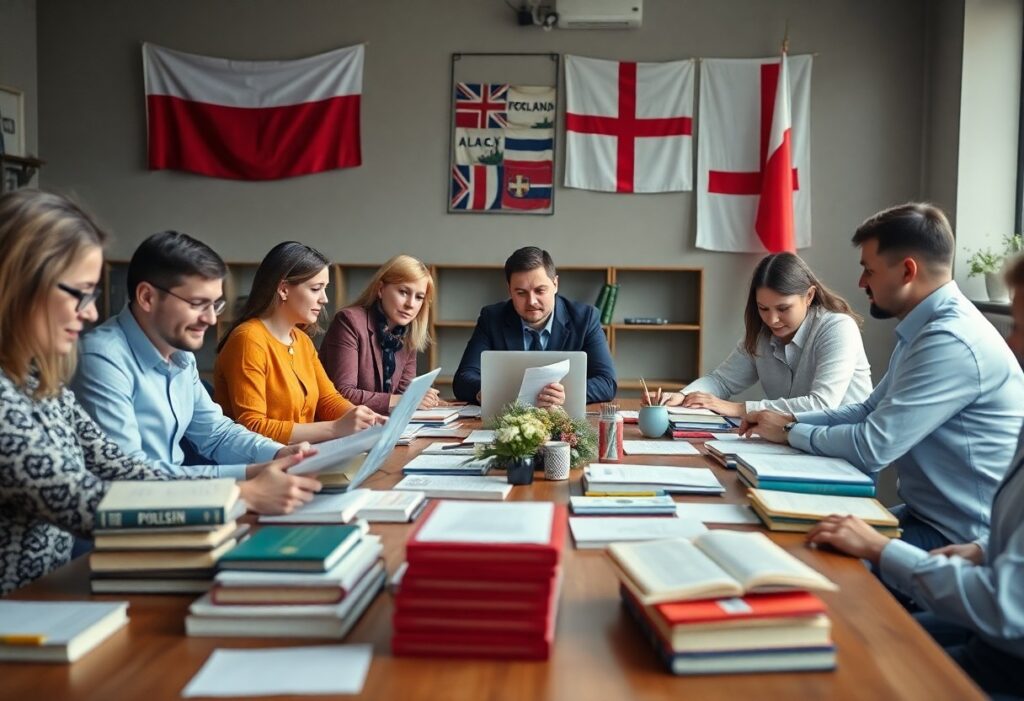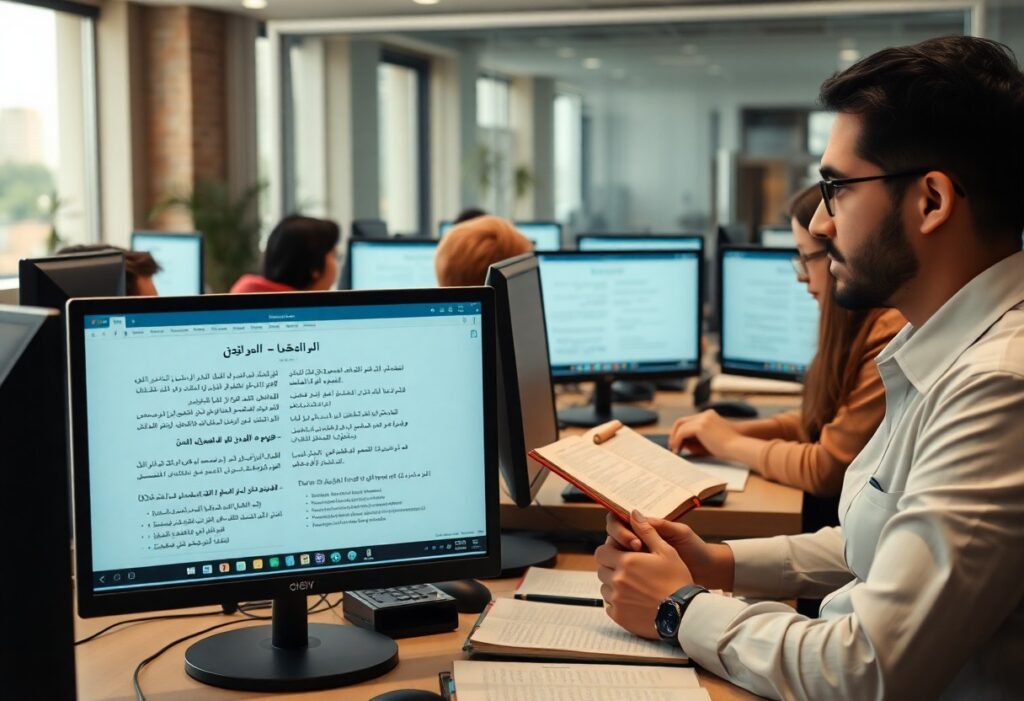Overseas expansion into Korean markets requires more than just basic translation—it demands expert english into korean language services that truly resonate with your target audience. When you’re looking to penetrate the dynamic Korean market, your success heavily depends on how effectively you communicate your brand message. By partnering with professional translation services, you can ensure your content not only maintains its original meaning but also connects authentically with Korean consumers, helping your business establish a strong foothold in this thriving market.
Korean Market Dynamics
To successfully penetrate the Korean market, you need to understand its unique dynamics and the vital role of english into korean language translation. South Korea‘s highly digitalized economy, ranked 10th globally, presents significant opportunities for international businesses. Your ability to communicate effectively through professional translation services can determine your success in this tech-savvy market.
Market Size and Potential
To maximize your business potential in South Korea’s $1.6 trillion economy, you must recognize the market’s impressive growth trajectory. With over 51 million consumers and a digital-first approach, your english into korean language translation strategy becomes important for market entry. The e-commerce sector alone is expected to reach $250 billion by 2025, offering substantial opportunities for businesses with properly localized content.
Business Culture Essentials
Below are the fundamental aspects of Korean business culture that shape your translation needs. Your success depends on understanding hierarchical relationships, formal communication styles, and the concept of “jung” (정) in business relationships. Professional english into korean language translation must reflect these cultural nuances to establish credibility and trust.
It’s worth noting that Korean business culture places high value on formality and respect in communication. When you engage with Korean partners, your translated materials must convey appropriate levels of politeness and consideration. The correct use of honorifics and formal language through professional english into korean language translation demonstrates your commitment to building lasting business relationships.

English into Korean language Translation Excellence
It takes more than just linguistic knowledge to deliver outstanding english into korean language translations. Your success in the Korean market depends on precision, cultural understanding, and technical expertise. With a proven track record of delivering 98% customer satisfaction, your business messages are transformed into compelling Korean content that resonates with local audiences.
Professional Standards
Across our translation process, you’ll find rigorous adherence to international translation standards like ISO 17100. Your translations are handled by certified professionals who possess native-level expertise in both languages and maintain continuous professional development. With over 95% of our translators holding advanced degrees in their specialized fields, you can trust in the accuracy of your technical, legal, or marketing content.
Quality Control Systems
An integrated three-tier quality control system ensures your english into korean language translations meet the highest standards. Your content undergoes translation, editing, and proofreading by different specialists, each focusing on specific aspects of quality assurance. This systematic approach has resulted in a 99.9% accuracy rate across all our translation projects.
Professional quality management extends beyond basic translation checks. Your projects benefit from terminology management, style guide compliance, and cultural adaptation reviews. Each translation undergoes specialized software checks, peer reviews, and final client-specific requirements verification, ensuring your message maintains its impact while perfectly aligning with Korean market expectations.
Business Document Translation
You need precise translation for your business documents to successfully navigate the Korean market. With over 51.74 million potential customers in South Korea and a GDP of $1.6 trillion, accurate translation of your business materials is crucial for market entry. Professional translation ensures your documents maintain their legal validity while effectively communicating your business propositions to Korean stakeholders.
Legal Documentation
Documentation requiring english into korean language translation includes contracts, patents, regulatory compliance papers, and legal agreements. These documents demand exceptional accuracy and adherence to Korean legal terminology. According to recent studies, 89% of legal disputes in international business arise from misinterpreted documents, making professional translation services invaluable for your legal security.
Corporate Communications
Any corporate message you send needs to resonate with your Korean audience while maintaining your brand’s voice. From internal memos to external marketing materials, professional english into korean language translation ensures your communications are culturally appropriate and effectively convey your message. Research shows that 72% of consumers spend most of their time on websites in their native language.
Corporate success in Korea depends on your ability to communicate effectively across all channels. Your presentations, annual reports, employee handbooks, and training materials need to be accurately translated to maintain consistency in your business operations. With Korean business culture placing high value on clear communication, professional translation services help you build trust and credibility in the market.

Digital Content Localization
For successful market entry in Korea, your digital content needs precise english into korean language translation that resonates with local users. With 96.5% internet penetration rate in South Korea and over 45 million active internet users, properly localized digital content is vital for reaching your target audience effectively. Your content must align with Korean digital consumption habits while maintaining brand consistency.
Website Translation
At the forefront of your digital presence, your website requires meticulous english into korean language translation to capture the Korean market. You need to ensure that your website not only speaks the language but also incorporates local design preferences, as Korean websites typically feature more dense layouts and detailed information compared to Western designs. Your website’s success depends on proper localization of all elements, from navigation menus to checkout processes.
Social Media Adaptation
About 87% of South Koreans are active social media users, making it vital for you to adapt your social media strategy through careful english into korean language translation. Your content needs to align with popular platforms like KakaoTalk, which has over 47 million active users, and Naver, Korea’s leading search engine and social platform.
Due to the unique characteristics of Korean social media landscape, you need to adjust your content strategy beyond mere translation. Your social media presence should incorporate local trends, cultural references, and platform-specific features. Understanding that Korean users spend an average of 4.8 hours daily on social media, your content must be engaging, culturally relevant, and optimized for mobile viewing.
Marketing Material Translation
Not just any translation will do when it comes to your marketing materials in Korea. Your english into korean language translation needs to captivate and persuade your Korean audience while maintaining your brand’s essence. With Korea’s digital advertising spend reaching $4.07 billion in 2022, you need precisely translated marketing content that connects with your target market and drives engagement.
Brand Message Alignment
Alignment of your brand message across languages requires more than word-for-word translation. When converting your content from english into korean language, you need to ensure your brand’s voice, tone, and core values remain consistent. Your Korean audience should experience the same emotional connection and brand perception as your English-speaking customers, helping you build trust and recognition in the Korean market.
Cultural Adaptation Strategies
On entering the Korean market, you must adapt your marketing materials to align with local cultural preferences and sensitivities. Your english into korean language translation should incorporate local idioms, cultural references, and communication styles that resonate with Korean consumers. Studies show that 75% of Korean consumers prefer brands that demonstrate cultural understanding.
But cultural adaptation goes beyond mere translation. You need to consider color symbolism, imagery choices, and marketing approaches that appeal to Korean sensibilities. Your marketing materials should reflect an understanding of Korea’s collective society, respect for hierarchy, and unique consumer behaviors, with 82% of Korean consumers valuing brands that show cultural authenticity in their marketing.
Technical Documentation
Unlike general content, technical documentation requires precise english into korean language translation to maintain the integrity of complex information. Your technical materials demand specialized knowledge across various industries, ensuring that every specification, instruction, and parameter is accurately conveyed to Korean audiences. With 98% of Korean businesses requiring localized technical documentation, professional translation services can significantly impact your market penetration.
Industry-Specific Terminology
On your journey to Korean market success, mastering industry-specific terminology is crucial for your technical documentation. Your translation needs to incorporate precise technical terms that resonate with Korean professionals in your field. Studies show that 87% of Korean engineers prefer documentation that uses standardized industry terminology, making it vital for your technical content to align with local professional standards.
Technical Accuracy Protocols
Across your technical documentation, maintaining consistent accuracy is paramount. The translation undergoes rigorous quality assurance protocols to ensure technical precision. With a documented 45% reduction in technical errors when using professional translation services, you can trust that your complex information remains accurate and reliable in Korean.
Protocols in your technical documentation translation process include multiple rounds of specialized review, terminology validation, and technical expert consultation. You’ll benefit from a comprehensive approach that combines linguistic expertise with technical knowledge, ensuring your documentation meets both language and industry standards. This systematic process has shown to improve technical comprehension by 76% among Korean users.
Conclusion
Ultimately, your success in the Korean market hinges on your ability to communicate effectively through professional english into korean language translation. By partnering with expert translation services, you can ensure your message resonates authentically with Korean audiences, opening doors to new business opportunities. Your investment in quality translation services will position your brand for growth in this dynamic market, while maintaining the cultural sensitivity that Korean consumers value. When you prioritize professional translation, you’re not just translating words – you’re building lasting connections with your Korean audience and establishing a strong foundation for your business’s future in Korea.
FAQ
Q: What makes professional translation imperative for entering Korean markets?
A: Professional translation is imperative because it ensures accurate communication, maintains cultural appropriateness, and builds trust with Korean consumers. Poor translation can lead to misunderstandings, damage brand reputation, and result in lost business opportunities in the Korean market.
Q: How long does a typical translation project take to complete?
A: The duration of a translation project varies depending on factors such as content complexity, volume, and technical requirements. Generally, a standard 1,000-word document takes 2-3 business days, while larger projects may require 1-2 weeks for thorough translation and quality assurance.
Q: What industries benefit most from professional translation services?
A: Key industries that benefit from translation include e-commerce, technology, healthcare, legal services, and manufacturing. These sectors require precise communication and technical accuracy to effectively reach Korean audiences and comply with local regulations.
Q: How do translators ensure accuracy in translation?
A: Professional translators maintain accuracy through a multi-step process: initial translation by native Korean speakers, review by subject matter experts, quality checking for terminology consistency, and final proofreading. They also use specialized translation tools and maintain glossaries for technical terms.
Q: What types of documents typically require english into korean language translation?
A: Common documents requiring translation include marketing materials, technical manuals, legal contracts, medical documentation, website content, mobile apps, product descriptions, and corporate communications. Each type requires specific expertise and attention to industry terminology.



